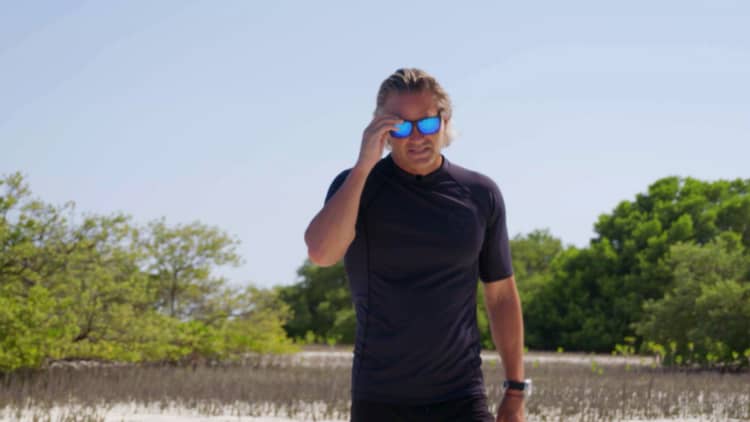It sounded like a typical New Year's resolution: On January 1, 1975, Robert "Raven" Kraft, promised he would run eight miles, every day, for 365 days. His friends thought he was crazy.
But 42 years and more than 15,000 days later, he's never missed a single run.
In the process, he's become an inspiration for many, taking more than 3,000 other runners out on what he calls "Raven Runs."
What leadership lessons can we learn from a person who has made running his purpose in life? Here are five from a recent interview with Kraft and from the recently released book, Running With Raven, by Laura Lee Huttenbach.
Anyone can become a leader
Kraft was an unlikely candidate to become an admired leader growing up. He came from a broken family and never went to college. His father left his family, his mother worked the night shift and Kraft was considered "Most Likely To Commit a Murder" in high school because he looked rough, typically wore all black and didn't have too many friends. For many years, he made ends meet by doing security work in a hotel.
As Kraft tells me in a phone interview: "You can't judge a book by its cover."
In his twenties, he became fascinated about running, and it ultimately became his trademark. He went for a daily run on Miami Beach, every day, for years on end. It made people change their mind about him, and turned him into a leader.
With his streak of over 15,000 daily runs without interruption, he's become the subject of features in Miami Herald, ESPN, Runner's Digest, and even Huttenbach's recently released book. As Kraft says, "Everybody has a place where they shine."

Success sometimes means just showing up
Kraft didn't become a leader because he was the best runner out there. Instead, he says, "the only times of interest to me are good times and fun times."
But the lesson here is that determination eats talent for breakfast. Forty-two years after his first daily runs, now in his late 60s, Kraft has become a living legend, and has a following that has outlasted most championship runners from the 1970s.
To become and remain a leader, consistency is much more important than peak performance. "It's about keeping your word," Kraft says. "It's about doing what you say you will do."
His appeal? "There's not a lot of things you count on life," he says. "But I'm one of them. I'll be there every day, at 5:30 at Miami Beach, as I have been for 42 years and five months."
What if he doesn't make it one day? "I'll be either dead or in real bad shape," he says.
Dedication is key
We all would like to become an instant success, but that's just not how it works. "I've been trying for 50 years to become an overnight success," Kraft says.
At first, he really did believe in becoming famous right away: He was an amateur songwriter and hoped to one day get credit for writing a hit song.
As running became more important to him, Kraft started to set different goals. He wanted to run 365 consecutive days, then 10 straight years, and then 100,000 miles. He got his motivation from setting those long-term goals.
The lesson here is that Rome wasn't built in a day. It was built throughout the centuries. The same goes for leadership: You don't become one overnight. You become a leader by amassing experience, working to earn a trustworthy reputation and building a follower base.

Keep it simple
Some of us want to become a CEO, others to get a well-paying job and many other career-related dreams. These goals usually come with an elaborate plan to make it all work: Go to an Ivy League college, move to New York or San Francisco, network and work 70-hour weeks. At the end, maybe, we'll achieve what we wanted and get rich.
Kraft doesn't think in those terms. "Keep it simple" is his motto. He has a phone and computer, but never owned a car. He bought a cheap apartment in Miami in the 80s, when the city was crime-ridden, and now owns expensive real estate.
Other than that, his life revolves around his daily run. "It works," he says. "I don't have to spend much money. I don't have to go windsurfing or traveling. Running is simple and free."
Never quit doing what you love
Since he was a teenager, Kraft's first love has been to write songs. A huge fan of Johnny Cash, he used to travel to Nashville and listen to his and other country music. But without credentials, or a famous backer, Kraft's songs never became popular.
While he didn't stop writing songs, and even has several recorded albums, it wasn't his songs that made him famous: It was his running.
It doesn't mean he gave up on his passion. In fact, Kraft says he wrote 18 songs last year and five already this year. Now, however, songwriting is a bonus.
"I feel really good about my songs," he says. "Maybe now they will be heard. If it's meant to be, it will be. But I put my run first."


